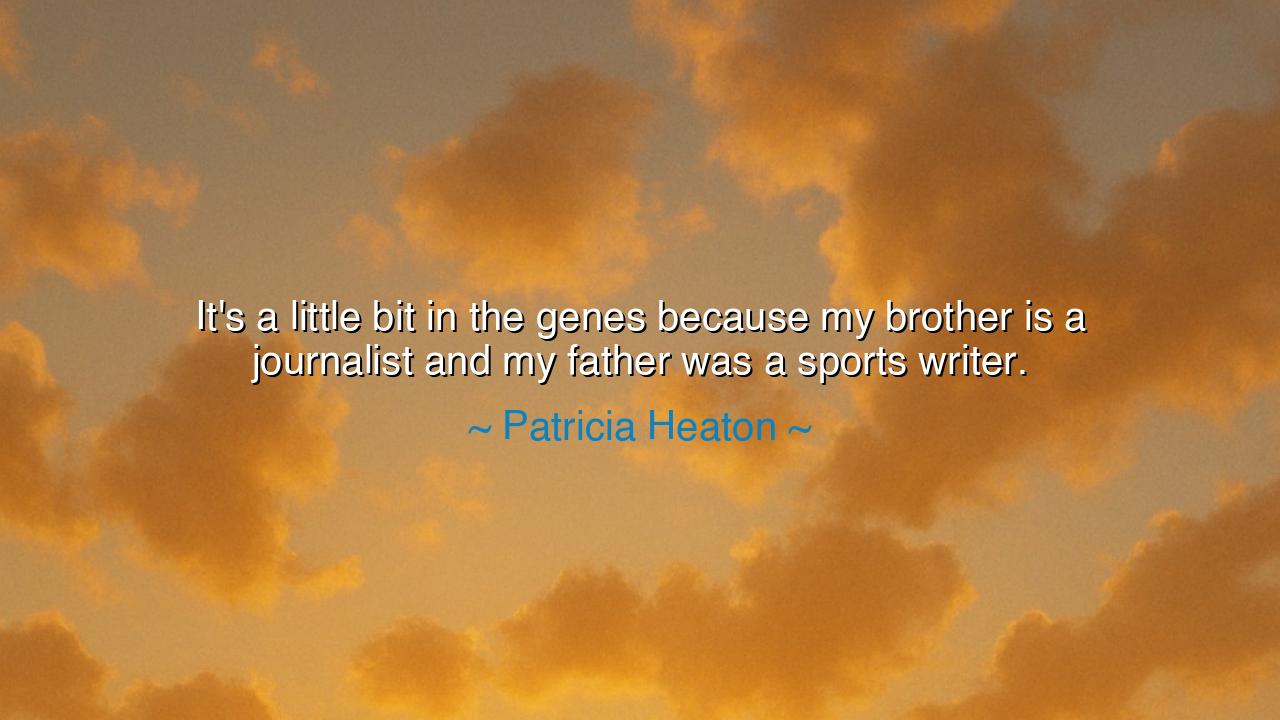
It's a little bit in the genes because my brother is a
It's a little bit in the genes because my brother is a journalist and my father was a sports writer.






When Patricia Heaton confessed, “It’s a little bit in the genes because my brother is a journalist and my father was a sports writer,” she offered us a glimpse into the mysterious thread that weaves destiny through family lines. Her words remind us that what we are is not shaped in isolation, but in the echoes of those who came before us. For talents, passions, and callings often pass like a torch, carried from hand to hand, generation to generation.
The ancients believed in this inheritance of spirit. They spoke of bloodlines that carried not only strength of body, but also virtues, gifts, and inclinations of the soul. A son of warriors was thought born to courage, a daughter of poets to song. Heaton’s reflection on her father, a sports writer, and her brother, a journalist, is no accident. In their ink-stained pages, she saw the seeds of her own craft as a storyteller and performer. She shows us that family legacies are not cages, but rivers flowing into the present, nourishing those who step into their waters.
Consider the tale of Alexander the Great. His father, Philip of Macedon, was a master of conquest and statecraft; his mother, Olympias, filled him with tales of divine lineage. From such roots, Alexander did not invent his greatness from nothing—he drew from the soil tilled by those before him. Just as Heaton was shaped by a family of words, Alexander was forged by a family of ambition. The greatness of a line, if embraced, may become the foundation of destiny.
But there is humility in Heaton’s words. She does not claim her achievements are hers alone, nor does she boast of divine talent. Instead, she acknowledges the genes, the invisible inheritance that shaped her world. This is wisdom: to see oneself as part of a greater chain, to honor the sources of one’s strength, and to recognize that no gift springs wholly from the self. In this acknowledgment lies both gratitude and grounding.
Her words also carry a quiet challenge. Though family may plant the seed, it is up to the individual to tend it, to shape it, to bring it to flower. The ink that ran through her father’s hands could have dried; the curiosity that shaped her brother could have been ignored. Yet she chose to cultivate that inheritance, to turn her legacy of storytelling into a life of art, performance, and influence. It is not enough to inherit—one must awaken the gift and let it live.
The lesson, then, is this: look to your own lineage, not only for burdens, but for treasures. There may be hidden strengths within your family that call to you—disciplines, virtues, or passions waiting to be claimed. Do not dismiss them as coincidence. Instead, ask what talents, what inclinations, flow in your blood. Then, honor them. Take what is given, shape it into something new, and let it shine in your own time.
Practically, this means reflecting on the stories of your kin. Who shaped you? What gifts, spoken or unspoken, were passed to you? Write them down, name them, and decide how you will carry them forward. Do not merely repeat the past—expand it, refine it, and let your own children, or students, or community inherit not only what you received, but also what you created.
Thus, Patricia Heaton’s words remind us: heritage is not fate, but foundation. Within our families lie the seeds of destiny—be they words, courage, wisdom, or craft. It is for us to choose whether those seeds grow, or whether they are left to wither. To honor them is to honor both past and future, weaving ourselves into the eternal chain of human greatness.






AAdministratorAdministrator
Welcome, honored guests. Please leave a comment, we will respond soon